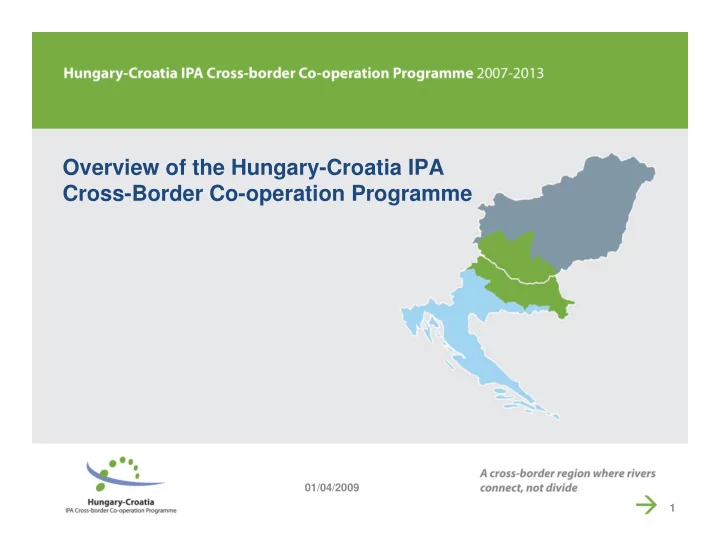

Overview of the Hungary-Croatia IPA Cross-Border Co-operation Programme 01/04/2009 1
Instrument for Pre-Accession • An integrated Pre-Accession Instrument to assist candidate (CC) and potential candidate countries (PCC) to adopt and implement the „acquis” and to prepare for EU funds on accession– non Member State is focused in cross-border IPA Programmes! • Structural Funds rules for cross-border co- operation at EU internal borders to apply at EU external borders with CC-s and PCC-s 01/04/2009 2
Specific characteristics of the Programme (1) • Single budget chapter – funding coming in a balanced way from IPA and ERDF – single pot of money, to be spent on both sides of the border under one set of rules • Programme budget validity – Programme is drafted as a 7-year strategic document (2007- 2013), but the financial resources cover only 3 years, 2007- 2009 – Rolling method: Programme could be modified every year after 2009 01/04/2009 3
Specific characteristics of the Programme (2) • 2-step Programme approval process – Commission decision approving Programme: addressed to Member State (13 March 2008) – Financing Agreement with non-Member State – costs are only eligible in Croatia from the signature (1 December 2008) • Shared management between Member State and non Member State – single set of management structures, where both countries are represented – single set of rules for implementation • Beneficiary country (non MS) – has to prepare the necessary structures and documents so that the Programme can be operational 01/04/2009 4
Single set of management structures Task Programme body Programme monitoring and project Joint Monitoring Committee (JMC) selection Responsibility for the management and Managing Authority (MA) implementation of the Programme - National Development Agency, Budapest Certificate and statement of expenditure Certifying Authority (CA) and application for payment, receipt of - Ministry of Finance, Budapest payments from EC Verification of the functioning of Audit Authority (AA) Programme bodies - Government Audit Office, Budapest Support to Programme bodies and day-to- Joint Technical Secretariat (JTS) day management of Programme - set up in VÁTI Kht, Budapest implementation Support to JTS in Croatia Information Point (IP) - contracted by Ministry for Regional 01/04/2009 Development, Forestry and Water Management 5 (MRDFWM), set up in Osijek
Singe set of rules for implementation • Contracting: one subsidy contract from Community funding for the whole project • Single set of rules for validation of expenditure (control of invoices) for Control Bodies in both countries • Single set of rules for project implementation : reporting periods, eligible expenditure, information and publicity, public procurement 01/04/2009 6
Lead Beneficiary principle (1) – One Lead Beneficiary represents the project and bears overall responsibility in the frame of one partnership agreement for all project partners 1) Signing partnership agreement for relations with partners in the project 2) Ensuring project development, submission of project proposal to JTS and project implementation 3) Ensuring that expenditure presented by partners has been paid during implementation (corresponding to the activities) and has been validated by Control Bodies 01/04/2009 7
Lead Beneficiary principle (2) – One Lead Beneficiary represents the project and bears overall responsibility in the frame of one partnership agreement for all project partners 4) Collecting declarations of validation of expenditure from partners, submitting project progress report and application for reimbursement to JTS 5) Upon receipt of Community funding, transferring funding to partners 01/04/2009 8
Reporting procedure • 4-month reporting periods • 3-month submission period for project progress report and application for reimbursement 1) Each Project Partner submits partner report to Control Body 2) Control Body checks partner report and issues declaration on validation of expenditure based on the invoices (on-the-spot checks carried out if needed) 3) Lead Beneficiary collects declarations on validation of expenditure from each partner and prepares application for reimbursement 4) Lead Beneficiary prepares project progress report and hands it in with the application for reimbursement to the JTS 01/04/2009 9
Payment procedure • Payment procedure 1) JTS-MA-CA: approval of application of reimbursement and transfer of community funding to VÁTI Kht 2) Functionally independent unit of VÁTI Kht transfers community funding to the Lead Beneficiary 01/04/2009 10
Lead Beneficiary - Project Partner (1) Lead Beneficiary (LB) Project Partner (PP) JTS •For HR PP: Control Body Programme body to in Croatia (MRDFWM) contact •For HU PP: Control Body in Hungary (VÁTI Kht) Subsidy contract for •For HR PP: if relevant, Contract type for the Community funding with MA state contribution contract awarded subsidy concluded with MRDFWM •For HU PP: state contribution contract concluded with VÁTI Kht on behalf of NDA 01/04/2009 11
Lead Beneficiary - Project Partner (2) Lead Beneficiary (LB) Project Partner (PP) Between MA and LB: Between LB and PP-s: Contractual liability subsidy contract partnership agreement Whole project Given project part Responsibility Project progress report Partner report to Control Report type to JTS Body Application for Declaration on verification Financial reimbursement – JTS of expenditure – Control documentation Body 01/04/2009 12
Partnership • Role of the Lead Beneficiary • Number of partners • Reliability of Project Partners 01/04/2009 13
Financial considerations • Financial liquidity of Project Partners due to the timeframe needed for reimbursement of costs • Advance payment only in Hungary for the amount of state contribution per partner • Differences in minimum amount of own contribution – HU: 5% for each Project Partner – HR: 15% for public entities, private entities do not have obligation for own contribution • Contracts will be stipulated in EUR 01/04/2009 14
Human resources • Elaboration of a proper partnership agreement • Managing procurements according to PraG 01/04/2009 15
Thank you for your attention! RÓZSA Diána Head of Joint Technical Secretariat 01/04/2009 16
Recommend
More recommend